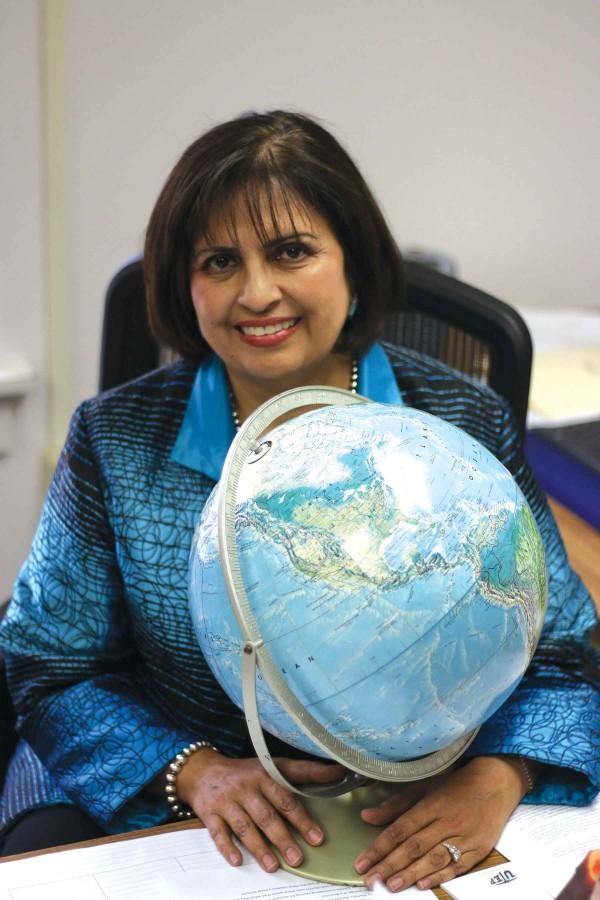From the cold weather of Quebec to the hot sun of the border, Irasema Coronado, political science professor, is back at UTEP and ready to share the knowledge she gained while she was away.
In 2010, she was appointed by President Barack Obama to the Joint Public Advisory Committee of the Commission for the Environmental Cooperation, which concentrates on environmental issues in Mexico, Canada and the United States. While based in Quebec, the commission brought in ideas to help solve environmental issues.
“The environment has a huge problem with pollution in water, animal species, habitats, ecosystems, electronic waste, energy, but to be able to say that I helped a little bit to solve the problem in the environment makes feel like a model for future generations,” Coronado said.
Coronado, 56, served as the executive director of the commission for three years and said it was a difficult and exciting moment in her life.
“I worked all together on 48 projects,” Coronado said. “I was able to help on topics about saving the environment of North America. We did projects about the trafficking of endangered animal species, grasslands in North America, acid batteries in North America, we also did environmental projects in different communities—mostly rural and indigenous.”
When Coronado came back to El Paso in mid-January she realized how much she missed many things from both cities.
“From Canada I miss public transportation, I miss walking to work every day, the learning experience I got there,” Coronado said. “In the coldest days in Canada, I missed the weather of El Paso and my family.”
Coronado was born in Nogales, Arizona, and got her doctoral degree from the University of Arizona. As a graduate student, she worked on a water project along the U.S./Mexico border and then interned at the U.S. Environmental Protection Agency while earning her Ph.D. The water project is what helped pave the way for her future endeavors.
From border to border, Coronado has been aware of the inequalities people face each day. She said her hometown of Nogales was the place where she learned how to make a change.
“We grew up in a very compassionate, caring and, in a way, an activist household in the sense that you serve your community and you serve others,” Coronado said.
Coronado said her father and mother became an inspiration because of their love and compassion toward anyone who crossed their paths.
“The main difference in my house is that my dad was a feminist. He really believed in the empowerment of women,” Coronado said. “He was a very encouraging person, and he taught us to believe that we could do anything we wanted to do, he just had this great ability to empower you and make you feel you could do anything in the world.”
While her father worked as bread distributor in Arizona, Coronado’s mother took her and her five siblings to volunteer at orphanages in the area.
To this day, her mother is an active volunteer who helps deportees in Nogales, Sonora.
“She wanted us to feel compassion and gratitude. My mother would say, ‘be compassionate that poor people have to suffer this way, and be thankful that you have a good life,’” Coronado said.
Coronado hopes that the involvement of Hispanic students can grow to better help the entire community.
“I want more people like me to be in decision-making positions and to be in positions of leadership,” Coronado said.
Kathleen Staudt, a fellow political science professor, is both a friend and colleague of Coronado.
“She is a brilliant political analyst and dynamic leader. We have co-authored several research publications, including a book, articles and chapters. UTEP and the border region are fortunate she has chosen to be with us,” Staudt said in an email interview.
Some students said Coronado’s teaching style makes learning fun.
“She is more than willing to stop the class and go more in depth to help students want to learn,” said Jimmy Covarrubias, junior history major. “She works very well with you—very non-traditional teaching types of methods. She is different, her style is refreshing.”
Guillermina Gina Nuñez-Mchiri, interim director of the Women and Gender Studies Program, said Coronado has motivated her in many ways.
“She’s been a friend, a colleague, a researcher—she has been a mentor to me,” Nuñez said. “She has taught me valuable lessons. She’s been a key member in my life and in my son’s life. I’m so delighted she is back.”
Coronado will be speaking at the University of Texas Rio Grande Valley on April 20 and 21. She said she wants to make a difference in people’s lives by talking about political and environmental activism on the U.S./Mexico border.
“We need to re-inspire people,” Coronado said. That is our goal.”
Rene Delgadillo may be reached at [email protected].








W Moreno • Apr 26, 2017 at 11:16 AM
Professor Coronado was my professor and continues to be my mentor and inspire me to reach higher. This is a great article that celebrates one of the greatest s-hero’s of my life!